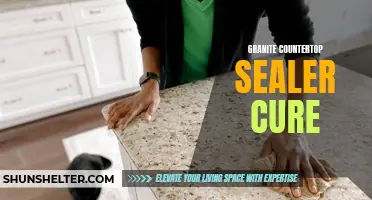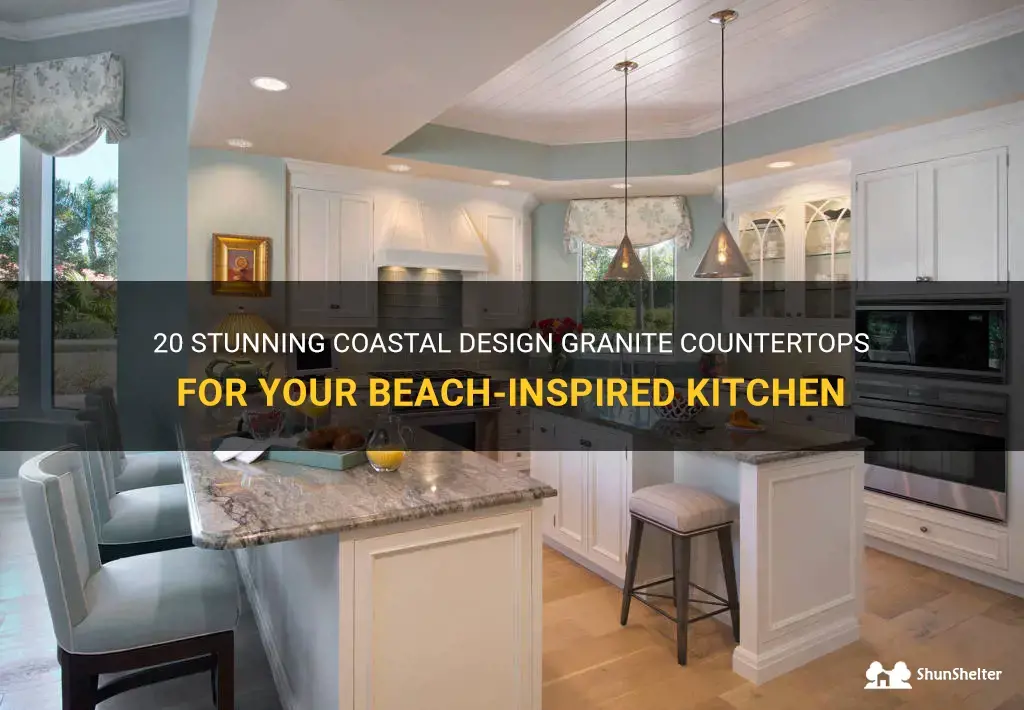
Coastal design granite countertops offer a perfect blend of functionality and beauty, creating a serene and relaxed atmosphere reminiscent of the oceanic surroundings. The natural elegance and durability of granite make it an ideal choice for coastal-themed kitchens or bathrooms, as it effortlessly complements the soothing color palettes and organic textures commonly found in these spaces. With its unique veining patterns and cool-toned hues, coastal design granite countertops can instantly transport you to a beachside retreat, providing a timeless and tranquil aesthetic that will make any space feel like a vacation getaway.
| Characteristics | Values |
|---|---|
| Color | Various shades of white, gray, blue, and green |
| Pattern | Waves, swirls, and dramatic veining |
| Finish | Polished or honed |
| Thickness | Typically 2 or 3 centimeters |
| Durability | Highly resistant to heat, scratches, and stains |
| Maintenance | Requires regular sealing |
| Cost | Moderate to high |
| Texture | Smooth and glossy |
| Edge Profile | Customizable, but often simple and straight |
| Complementary Features | Light-colored cabinets, beach-themed decor |
| Popular Types | White Ice, Blue Pearl, Seafoam Green, Delicatus White |
What You'll Learn
- What are the benefits of using granite countertops in coastal design?
- Are there specific colors or patterns of granite that work best with coastal design?
- How do granite countertops hold up against the elements in coastal areas?
- Are there any special maintenance or care requirements for granite countertops in coastal design?
- Can granite countertops be used in outdoor coastal design spaces, such as outdoor kitchens or patios?

What are the benefits of using granite countertops in coastal design?
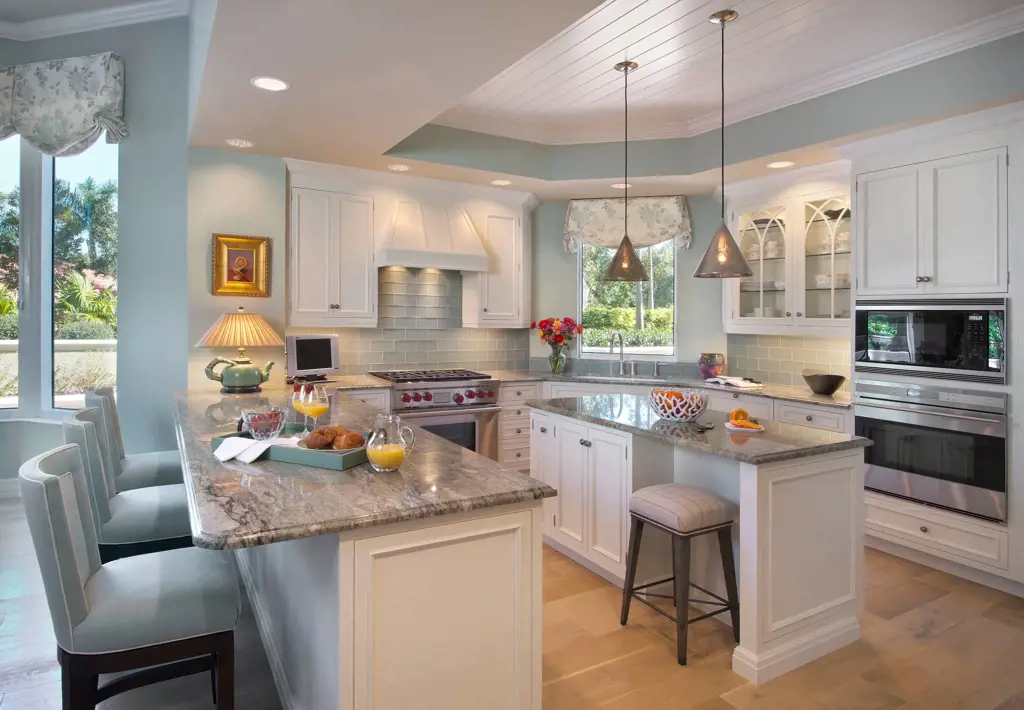
Granite countertops are a popular choice for coastal design due to their numerous benefits. Coastal design often emphasizes a clean, natural aesthetic that blends seamlessly with the surrounding environment. Granite countertops provide this desired aesthetic while also offering durability, heat resistance, and low maintenance. In this article, we will explore the various benefits of using granite countertops in coastal design.
- Durability: Granite is an incredibly durable material, making it an ideal choice for coastal areas where the countertops may be exposed to high levels of moisture and humidity. Granite is resistant to stains, scratches, and heat, making it perfect for withstanding the demands of coastal living. It can also withstand the harsh effects of saltwater air and UV exposure.
- Heat Resistance: In a coastal kitchen, there is often a lot of cooking happening, and granite countertops can handle the heat. Granite is highly resistant to heat, so placing hot pots and pans directly on the surface will not damage or discolor it. This heat resistance is particularly advantageous when cooking seafood, which often involves high temperatures.
- Low Maintenance: Granite countertops require minimal maintenance compared to other materials. They are easy to clean and only require regular wiping with a soft cloth and mild soap. The natural stone surface of granite does not harbor bacteria or mold, making it a hygienic choice for coastal kitchens. Additionally, granite countertops do not require sealing if properly installed.
- Natural Aesthetic: The natural beauty of granite makes it an excellent choice for coastal design. Coastal design often incorporates natural elements such as stone, wood, and sea-inspired colors. Granite countertops come in a range of earthy tones, including beige, brown, and gray, which complement the coastal design aesthetic. The intricate patterns and veining found in granite slabs can mimic the movement of ocean waves or the texture of weathered rocks, enhancing the overall coastal theme.
- Longevity: Investing in granite countertops is a long-term investment. Granite is a natural stone that is incredibly durable and resistant to wear and tear. When properly maintained, granite countertops can last for decades, making them a cost-effective choice in the long run. The durability of granite also means it is less likely to need replacement or repairs, saving homeowners time and money.
- Versatility: Granite countertops offer versatility when it comes to design options. They come in a variety of colors, patterns, and edge profiles, allowing homeowners to customize their coastal kitchen to their specific taste. Whether you prefer a coastal kitchen with light and airy colors or a more dramatic, dark-toned design, there is a granite countertop option to suit your vision.
In conclusion, granite countertops offer numerous benefits for coastal design. Their durability, heat resistance, low maintenance requirements, natural aesthetic, longevity, and versatility make them an excellent choice for coastal kitchens. By incorporating granite countertops into your coastal design, you can achieve a beautiful, functional, and long-lasting space that seamlessly blends with the coastal environment.
How to Effortlessly Maintain the Luster of Black Granite Countertops
You may want to see also

Are there specific colors or patterns of granite that work best with coastal design?
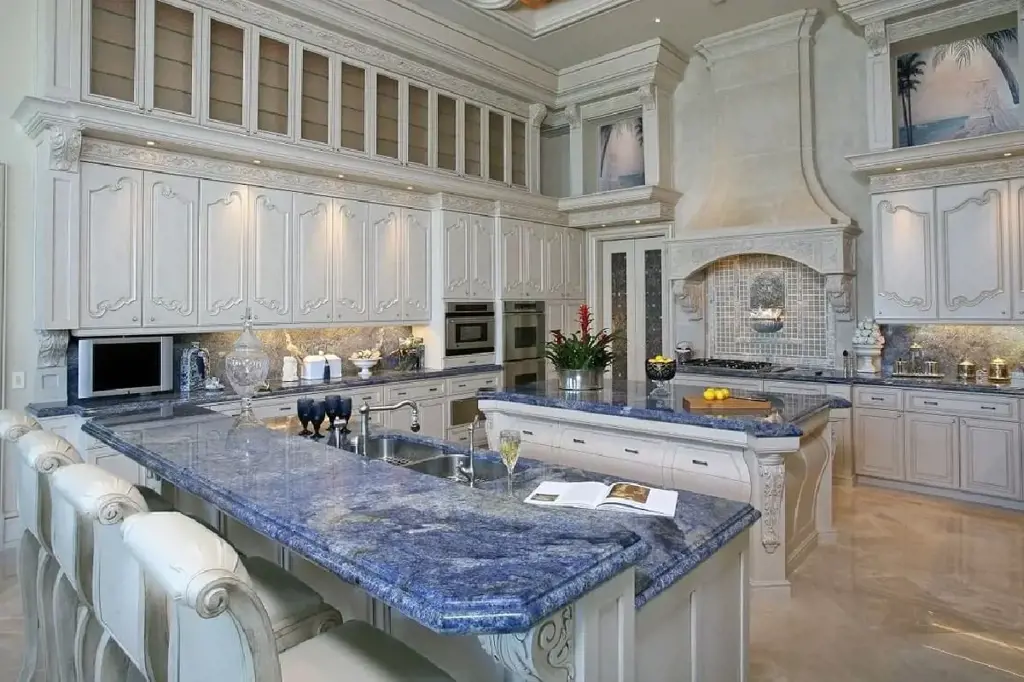
When it comes to coastal design, one important factor to consider is the selection of materials that can enhance the overall look and feel of the space. Among these materials, granite is a popular choice due to its durability and natural beauty. However, not all colors or patterns of granite work well with coastal design. In this article, we will explore the specific colors and patterns that are best suited for coastal design and provide some examples to inspire your next project.
Coastal design aims to create a serene and relaxing atmosphere reminiscent of the beach and ocean. Therefore, it is important to choose granite colors that can evoke these feelings. Light and airy colors are often preferred for coastal design as they can help create an open and tranquil space. Some popular granite colors for coastal design include white, beige, gray, and pale blue. These colors can emulate the colors of the sandy beach, the clouds in the sky, and the gentle waves of the ocean.
In terms of patterns, coastal design often incorporates elements that reflect the natural surroundings. Granite patterns with subtle veining or movement can mimic the flow of water or the patterns found in seashells. These patterns add depth and visual interest to the space without overpowering the overall design. Additionally, patterns that resemble waves or ripples can create a soothing and relaxing vibe.
Here are a few examples of granite colors and patterns that work well with coastal design:
- Calacatta Marble: This white granite with gray and gold veins is reminiscent of sandy beaches and can add a touch of elegance to a coastal design. It pairs well with light-colored cabinetry and can create a clean and timeless look.
- Santa Cecilia Light: This granite features a mix of beige and subtle gold tones with specks of gray. It can bring warmth and a natural element to a coastal kitchen or bathroom. It complements light wood cabinets and adds a cozy touch to the space.
- Sea Pearl: This granite has a pale gray background with hints of blue and green, reminiscent of the colors of the ocean. It can create a cool and soothing atmosphere in a coastal design. It pairs well with white or light gray cabinetry and can add a modern touch to the space.
- Delicatus White: This granite features a white background with gray and black specks that resemble seashells. It can add texture and a beachy vibe to a coastal design. It works well with white or light-colored cabinets and can create a fresh and inviting space.
When selecting granite for a coastal design, it is important to consider the overall color palette and the desired atmosphere of the space. Light and airy colors, as well as patterns that mimic the natural elements found in coastal environments, are key considerations. By choosing the right granite, you can enhance the coastal aesthetic of your design and create a space that feels like a soothing retreat by the sea.
The Perfect Combination: Butterfly Verde Countertops, Granite, and Clear Alder Cabinets
You may want to see also

How do granite countertops hold up against the elements in coastal areas?
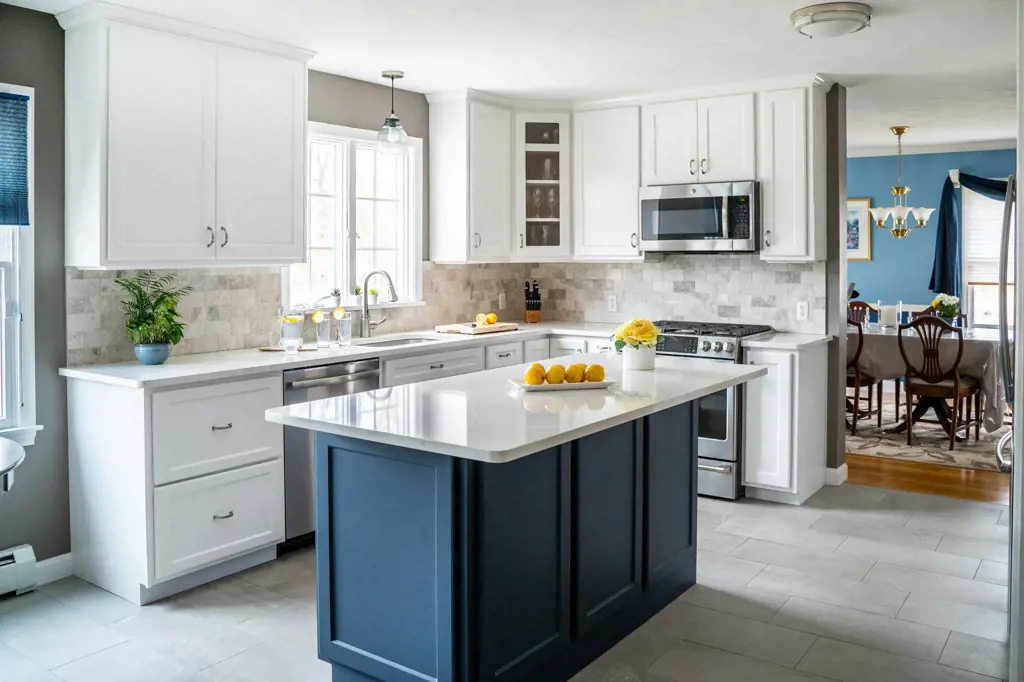
Granite countertops are a popular choice for kitchens and bathrooms due to their durability, beauty, and resistance to heat and scratches. However, in coastal areas where homes are subjected to harsh and constant exposure to saltwater, high humidity levels, and strong winds, it is important to consider how granite countertops will hold up against these elements.
One of the main concerns when it comes to granite countertops in coastal areas is the potential for damage from saltwater. Saltwater can be corrosive to certain materials, but fortunately, granite is not one of them. Granite is a natural stone that is formed deep within the earth's crust, and it is highly resistant to the effects of saltwater. This means that even if your granite countertop comes into contact with saltwater, it is unlikely to suffer any significant damage. However, it is still important to clean and dry the surface of the countertop after exposure to saltwater to prevent any residue from building up.
Another factor to consider is the high humidity levels in coastal areas. High humidity can promote the growth of mold and mildew, which can be a problem for any type of countertop. However, granite countertops are naturally resistant to mold and mildew. This is because granite is a very dense and non-porous material, which makes it difficult for moisture to penetrate and accumulate. Additionally, granite countertops are usually sealed during the installation process, which further enhances their resistance to moisture.
Strong winds can also be a concern in coastal areas, especially during storms and hurricanes. While granite countertops are generally very sturdy, they can still be damaged if they are hit by flying debris or if heavy objects are dropped on them. To minimize the risk of damage, it is important to secure any loose objects in your kitchen or bathroom before a storm hits, and to avoid placing heavy items near the edges of your countertop. If you live in an area that is prone to hurricanes, you may also want to consider investing in hurricane shutters or impact-resistant windows to protect your home and its contents.
In terms of maintenance, granite countertops in coastal areas require the same care as those in other environments. Regular cleaning with mild soap and water is typically sufficient to keep your countertops looking their best. Avoid using harsh or abrasive cleaners, as these can dull the surface of the granite. It is also recommended to reseal your granite countertops every one to three years, depending on the level of use and the specific recommendations of the manufacturer. Resealing helps to maintain the protective barrier on the surface of the granite and keeps it looking fresh and vibrant.
Overall, granite countertops are an excellent choice for coastal areas due to their durability and resistance to the elements. With proper care and maintenance, they can withstand the unique challenges posed by saltwater, high humidity, and strong winds. Whether you are building a new home or renovating your existing one, consider investing in granite countertops to enhance the beauty and functionality of your kitchen or bathroom while ensuring long-lasting performance.
The Beauty of Wilsonart Laminate Countertops: A Granite-like Look with Durability
You may want to see also

Are there any special maintenance or care requirements for granite countertops in coastal design?
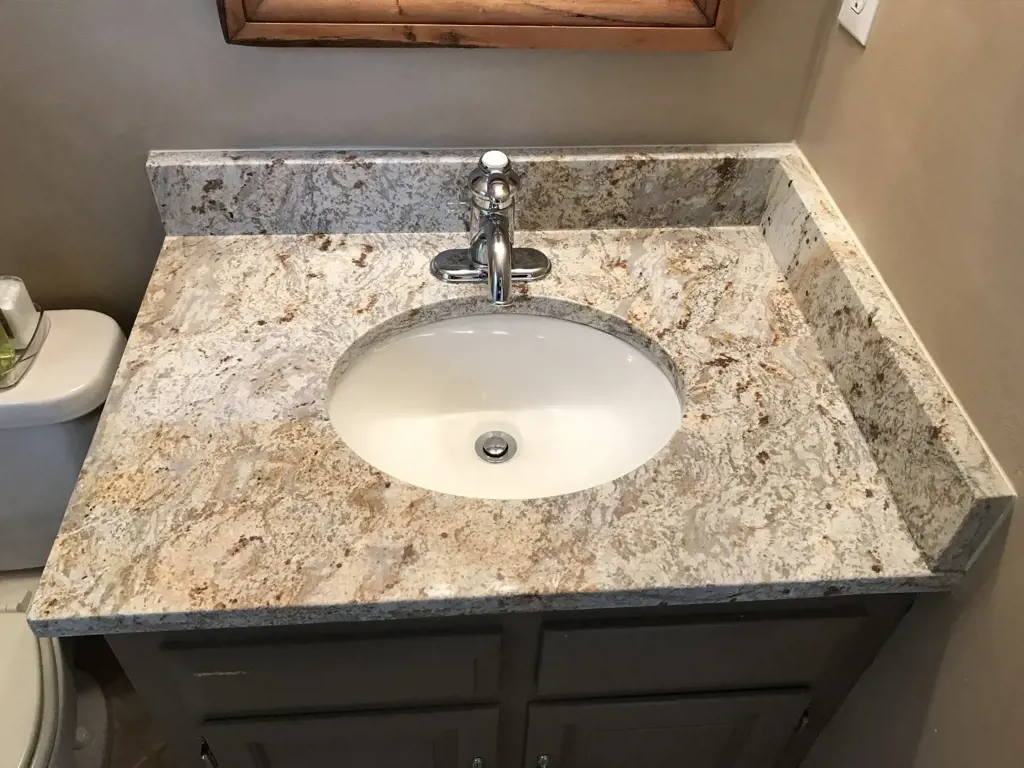
When it comes to coastal design, granite countertops are a popular choice due to their durability and natural beauty. However, living by the coast can present unique challenges for maintaining and caring for granite countertops. The salt air, high humidity, and exposure to sunlight can all impact the longevity and appearance of your countertops. Here are some special maintenance and care requirements to consider for your granite countertops in coastal design:
- Seal regularly: Granite is a porous material, which means it can absorb liquids and stains. Sealing your granite countertops regularly is essential, especially in a coastal environment where saltwater and humidity can accelerate the absorption process. Use a high-quality granite sealer specifically designed for coastal areas, and follow the manufacturer's instructions for application frequency.
- Clean with mild products: Avoid using harsh or acidic cleaners on your granite countertops, as they can damage the sealer and the stone itself. Instead, use a pH-neutral stone cleaner or a mixture of warm water and mild dish soap. Gently wipe the surface with a soft cloth or sponge, and avoid scrubbing too vigorously to prevent scratches.
- Protect from saltwater exposure: If you live right by the coast and your countertops are exposed to saltwater, take extra precautions to protect them. Rinse your countertops with fresh water after any saltwater contact, such as a spill or cleaning. This will help remove any salt residue and prevent it from corroding the granite over time.
- Use coastally resistant materials: In coastal design, it's not just about the countertops but also the surrounding elements. Ensure that your cabinets, backsplash, and other materials are also suitable for withstanding the coastal environment. Using coastal-resistant materials can help minimize the wear and tear on your granite countertops.
- Avoid direct sunlight: Excessive exposure to sunlight can cause your granite countertops to fade and lose their luster. If your kitchen receives a lot of sunlight, consider installing window treatments or using UV-protective film on your windows to minimize the harmful effects of UV rays.
- Avoid cutting directly on the surface: Although granite is a highly durable material, it's best to use cutting boards or mats when preparing food on your countertops. This will help prevent any accidental scratches or damage to the surface.
- Attend to spills promptly: Accidents happen, and if you spill something on your granite countertops, it's important to clean it up promptly. Certain substances, such as red wine or acidic liquids, can etch the surface and cause stains if left unattended for too long. Blot the spill with a clean cloth or paper towel, and gently clean the area using a stone cleaner or warm water and dish soap.
By following these special maintenance and care requirements for granite countertops in coastal design, you can ensure that your countertops remain beautiful and resilient for years to come. Regular sealing, gentle cleaning, and protection from saltwater exposure and direct sunlight are key to maintaining the longevity and appearance of your granite countertops in a coastal environment.
The Timeless Elegance of Granite Countertops in Minneapolis, MN
You may want to see also

Can granite countertops be used in outdoor coastal design spaces, such as outdoor kitchens or patios?
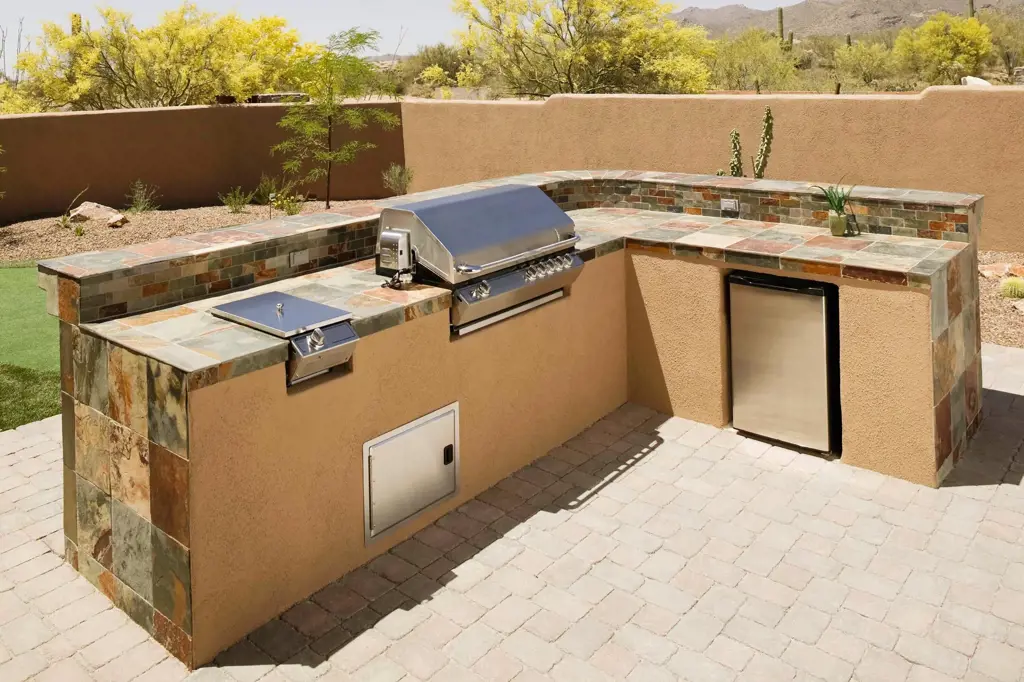
Granite countertops are a popular choice for indoor kitchens and bathrooms due to their durability and beauty. But can they also be used in outdoor coastal design spaces, such as outdoor kitchens or patios? The answer is yes, granite countertops can indeed be used in outdoor coastal design spaces, and here's why.
First of all, granite is a natural stone that is known for its strength and durability. It can withstand extreme temperatures, making it suitable for outdoor use. Whether it's exposure to the hot sun or the salty sea air, granite countertops can hold up well in coastal environments. This makes them a great choice for outdoor kitchens or patios near the coast.
One of the key advantages of using granite in outdoor coastal design spaces is its resistance to water damage. Granite is a non-porous material, which means that it doesn't absorb water or moisture. This is important in coastal areas where humidity levels can be high, and where countertops may be exposed to rain or splashes from the ocean. Granite countertops will not suffer from water damage, and they are also resistant to staining and mold growth.
In terms of maintenance, granite countertops in outdoor coastal design spaces require minimal care. Regular cleaning with a mild soap and water solution is usually enough to keep them looking great. Sealing the granite once a year can also help to maintain its appearance and prevent any staining or water damage. It's important to note that outdoor granite countertops may require more frequent sealing compared to indoor countertops due to their exposure to the elements.
Another advantage of using granite in outdoor coastal design spaces is its natural beauty. Granite comes in a wide range of colors and patterns, allowing you to choose a design that complements your outdoor space. Whether you prefer a light-colored granite with subtle patterns or a darker granite with bold veins, there is a granite option to suit every style. The natural beauty of granite can enhance the overall aesthetic of your outdoor coastal design space, creating a luxurious and inviting atmosphere.
When designing an outdoor coastal space with granite countertops, it's important to consider the surrounding elements. For example, pairing light-colored granite with white or light-colored cabinets and furniture can create a fresh and airy look. On the other hand, pairing darker granite with natural wood or wicker furniture can create a more rustic and coastal vibe. It's all about finding the right balance and creating a cohesive design that reflects the coastal environment.
In conclusion, granite countertops can be used in outdoor coastal design spaces, such as outdoor kitchens or patios. Their durability, resistance to water damage, low maintenance requirements, and natural beauty make them a great choice for coastal environments. When designing with granite, consider the surrounding elements and choose a design that complements the coastal aesthetic. With proper care and maintenance, granite countertops can withstand the elements and provide a stunning focal point in your outdoor space.
The Timeless Elegance of Antico Cream Granite Countertops
You may want to see also
Frequently asked questions
Yes, granite countertops are an excellent choice for coastal design. Granite is a natural stone that is incredibly durable and resistant to heat, scratches, and stains. It also comes in a wide variety of colors and patterns, allowing you to find the perfect option that complements your coastal design aesthetic.
Yes, light-colored granite countertops can work well in a coastal design. Light colors such as white, cream, and beige can evoke a beachy, airy feel that complements a coastal theme. Pairing light-colored granite with other coastal elements such as natural wood or seashell accents can create a cohesive and inviting coastal design.
Yes, it is important to seal granite countertops in a coastal design. Sealing helps protect the granite from potential damage caused by moisture, saltwater, and other coastal elements. It also helps prevent stains and makes the countertop easier to clean. It is recommended to have granite countertops professionally sealed every 1-3 years, depending on usage and the type of sealer used.





